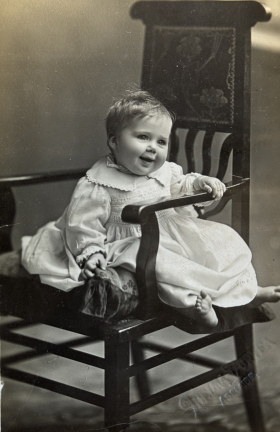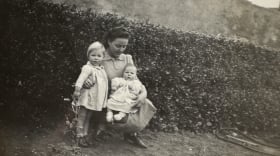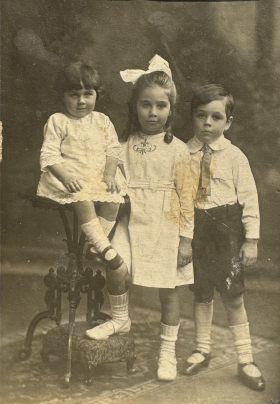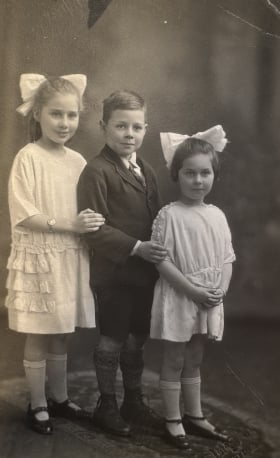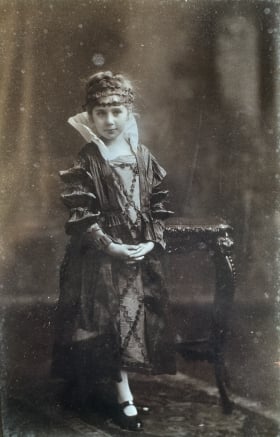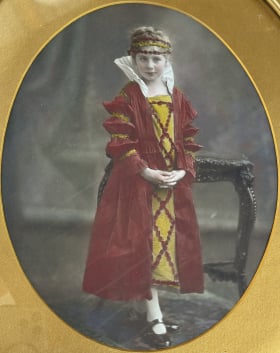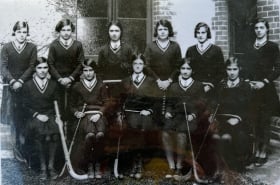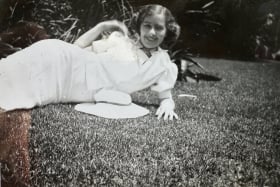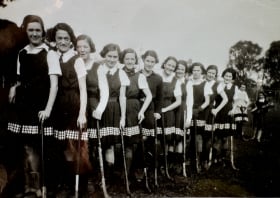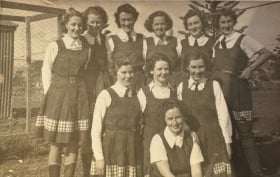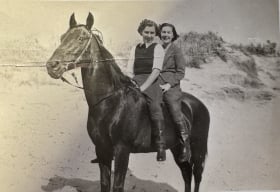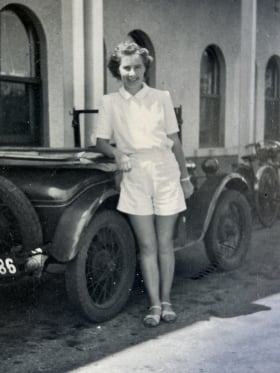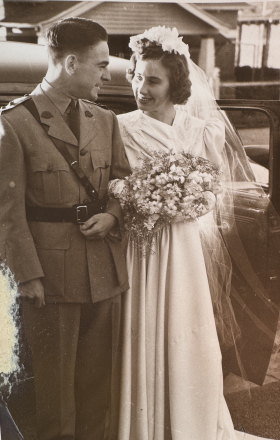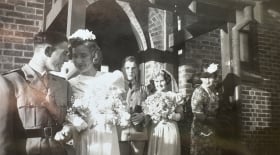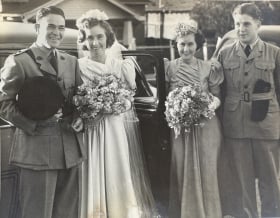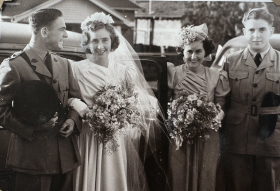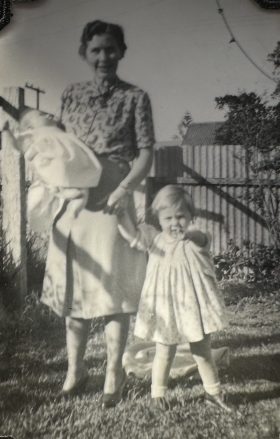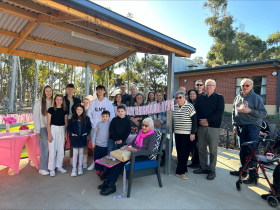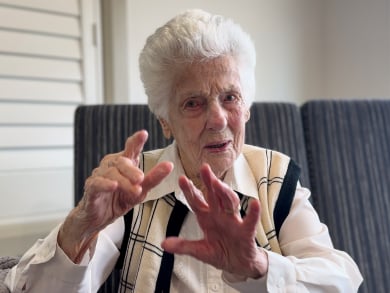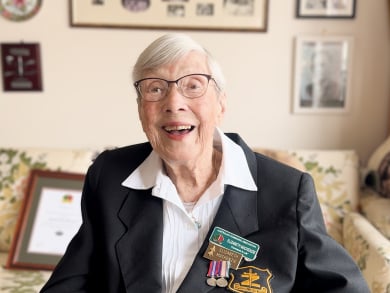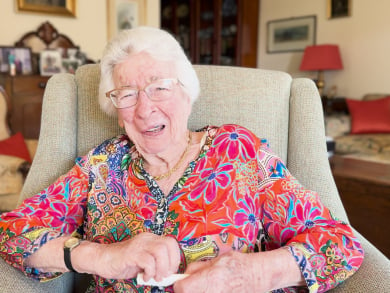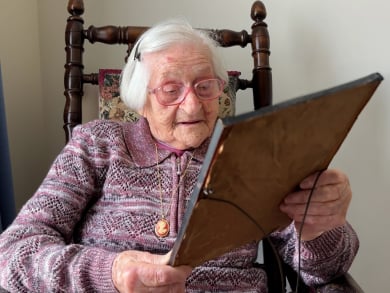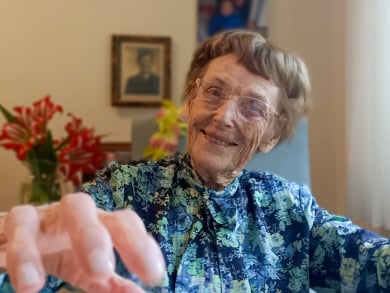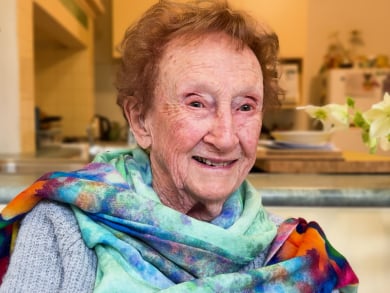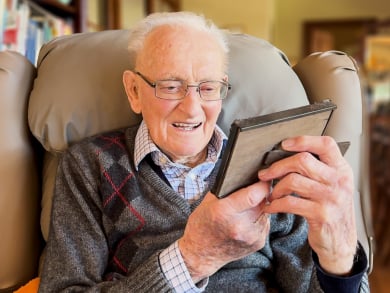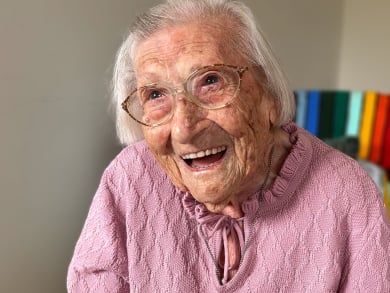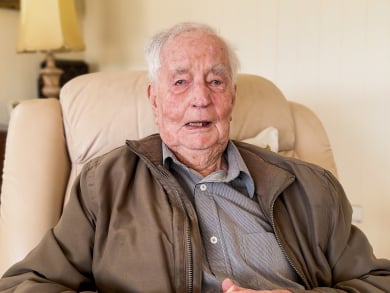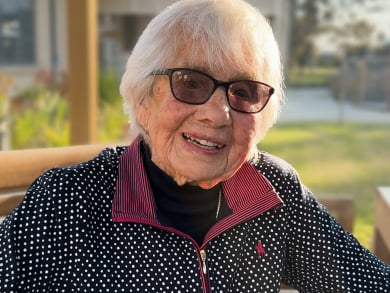Closed captioned icon
View audio transcription
I think the main thing is
to keep moving all the time, and even
physically
and in your thoughts,
you know, you you can't let
old fashioned ideas take over your life.
You must do this or you must do that.
You've got to live today,
by today's standard and keep
going with it and be happy with it.
"And I think that’s the main thing,
and you'll find that"
"most people are very happy
to come and help"
you get there.
It’s on the back.
It’s got my name on the back.
And I was born in 1914 in Adelaide.
My home at that stage
was up on the Peninsula
on the farm,
halfway between Kadina and Bute.
Now there's grandma Morgan from Scotland.
Her daughter, Olive Beatrice Morgan.
My mother.
And here, there's me.
In the front row
that was my mother.
"My grandmother lost her husband
when he was 30 years"
"and she was left
with a property to pay off"
"and five children,
and she educated them all."
"She had a difficult life
until the boy took over the farm"
and then she went to live in Adelaide.
"I have a younger brother
and a younger sister."
I had a sister with diphtheria.
She died.
She was about five when she died.
We had a very slow
life, really, when we were young.
And you didn't want any more.
"But today,
there is so much given to children."
And you can't wonder why they expect
more all the time, can you?
I went away to school when I was five
"to live with my grandmother
till my family came down"
later.
And, so I had
all my education in Adelaide.
That's me when I was about ten.
Well that's from the Unley School.
"We’re at a concert on North Terrace
in the Exhibition Building."
We were all singing a little song.
I don't remember what it was.
And I can remember as a child,
"my mother was very kind
and very good to us."
And on Friday nights
we would walk along Unley Road
and that was a real treat as a child.
And then I went on to a private school.
It was a small school.
St Peter’s Girls.
"I loved it there
and I feel perhaps in today's life,"
there's a little bit more competition
and I'm going to say,
perhaps I shouldn't, animosity with some.
And, I don't know why.
Education, different from today in as much
"we wouldn't have had as many subjects
as the children have today."
And I think they’re very lucky.
Wish I'd studied more more at school.
"Yes, I played at school
there and enjoyed it."
Fullback.
Center half back at times too.
I played in my 20s.
"We founded a team in Rundle Street
from working girls"
"and when we thought that
we could get into A grade, "
we were in C grade, B grade,
the War came so there was no hockey.
But that was from a team of girls
who were working together.
After I left school, I did
a short business course
and I was taken in to a private shoe firm,
A. A. Cheek & Son.
"He imported shoes
as well as Australian shoes and boots."
"And put in charge to take it over
in the bookkeeping section."
"And I was in that until I married
so that was quite interesting."
I think my married life...
was the happiest time of my life
with a husband and children.
Easily.
His name was Alan Frederick Henstridge.
"He was doing a course in army work,
I suppose, and I met him."
"And he was due to go to New Guinea
so off he went."
And that was when, having met him,
he asked me to marry him before he left.
And then he was on a motorbike,
a motorbike accident in Sydney.
He couldn't go overseas.
He was in hospital.
His leg was affected.
Yes, outside the church.
He got leave and came down on the Monday
"and said
I wanted to get married on Saturday."
"So on Tuesday,
Wednesday, Thursday, Friday, Saturday."
So I thought
my church is St Augustine’s.
"I can't get married in
a great big church like that,"
but I had played the organ
"in a little church in Fullerton,
St Chad’s."
"A friend of mine
who had took me to playing in the organ"
"there for Sunday school
and teaching the children,"
"so I booked that little tiny church
and got married there."
The church was full.
We just put a notice in the paper
and we had drinks at my home.
My mother looked after drinks.
So that was fun.
"We were much a muchness
in our temperament."
"Not like today's couples,
but very attached."
We had a very happy, happy marriage.
And he was
so good to me.
But you would never have thought so.
He never showed anything.
But he was wonderful to me.
He died in
2003
Well, that's Jennie
and the girl in the shop,
and David.
We went to live at Victor Harbor.
"He took over a shoe store
so we lived there for ten years,"
and then I had three children.
And we moved to Keith
"It was quite a challenge to move,
but I think in those days"
"you accepted whatever came to you
and you were quite happy"
to follow those ideas.
Yes, outside the front.
It was a four bedroom house.
It was a housing trust.
Actually, I wanted to live in the shed,
the motor shed, and build a house.
But my husband didn't like that idea.
I played the organ
at church for about 20 or 30 years.
"Played sport, bowls and golf,
was in the office at the golf course."
I even did news reporting.
So that was an experience.
My husband had help in the shop
at Keith but [whenever]
she was unavailable, I would help there,
quite willingly and happily.
We did give up
work in those days, didn't we?
And we took it.
And the only time I used to feel
a little bit forgotten
was weekends
when sport took over everything.
But you get used to it.
And if you've got children,
well you’re just happy to put up with it.
I don't like in one room
"all the time,
but I come out for fresh air."
I like people, so I think
even if you can't move around a lot,
if you have friends you can keep
talking to them and reading the news,
keeps you occupied in your body, I think.
"I feel sorry for my
body, what I've done to it."
I've broken my leg.
And my knees are shocking.
And I've lost a bit of my jaw bone.
I might be 110 years
but that hasn't got rid of me.
Thanks To
Jennie Jacobs
Lorna Henstridge
"It's a very busy world. Too busy."
Super centenarian and Australia's Oldest Woman.
Lorna Henstridge is a 110-year-old super centenarian and Australia’s oldest woman. We delve into her extraordinary life journey from her childhood on the Willamulka farm in the Yorke Peninsula to her education in Adelaide and her vibrant years in the regional South Australian towns, Victor Harbour and Keith.
Age in Video
110 yearsDate of Birth
6th June 1914Place of Birth
Adelaide, AustraliaThanks To
Jennie Jacobs
